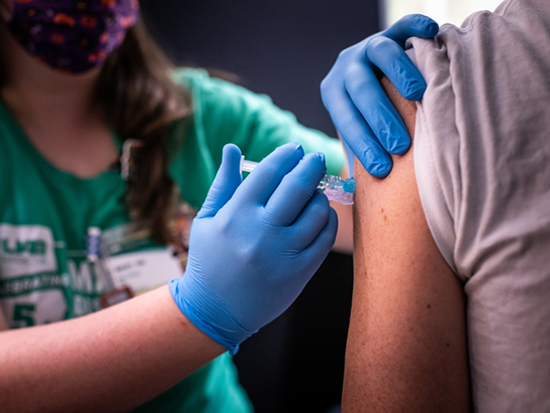As cold weather approaches, respiratory illnesses such as influenza (flu), respiratory syncytial virus (RSV), and whooping cough become more common, increasing risks for pregnant patients and healthcare providers.
Because the immune system is weakened during pregnancy, respiratory infections tend to be more severe in this population. Symptoms such as cough, fever, fatigue, and headache can lead to risks for both mother and baby.
Whether you’re a provider, staff member, or trainee, here are some key ways to stay healthy this season and keep patients safe.
Get vaccinated for the flu
-
Annual flu vaccination is mandatory for all UAB Medicine Workgroup C employees.
-
Faculty, staff, and trainees can get vaccinated through Employee Health Services. Visit the UAB Flu Shot Page for clinic times, locations, and documentation requirements.
-
Vaccination is particularly important for people who are at higher risk of serious complications from influenza.
-
Pregnant patients in their third trimester should receive the flu vaccine by September or October for optimal protection.
Encourage patients about other critical vaccines
-
RSV: Recommended between 32 0/7 and 36 6/7 weeks gestation during RSV season (September–January).
-
TDAP: TDAP is a vaccine that provides protection against three serious diseases: tetanus, diphtheria, and pertussis (whooping cough).
-
A Tdap booster dose is recommended for all adults every ten years to maintain protection against tetanus, diphtheria, and whooping cough. A single Tdap dose is also recommended during each pregnancy to protect the newborn from whooping cough. For Pregnant patients, it is ideally administered in the second trimester, but can be given at any point in pregnancy to protect newborns in early life.
-
Follow UAB’s visitation guidelines
To protect vulnerable patients, UAB enforces seasonal visitation rules from October 1 through March 31:
-
Caregivers who have a fever, cough, or other cold/flu symptoms are not allowed to visit.
-
Only the siblings of infant patients are allowed to visit Labor & Delivery, Mother-Baby Unit, and High-Risk Obstetrics when seasonal visitation guidelines are in effect, from October 1 through March 31 of each year.
-
Children under age 12 (including family members) are not allowed to visit Continuing Care Nursery and Regional Newborn Intensive Care Unit when seasonal visitation guidelines are in effect, from October 1 through March 31 of each year.
-
Caregiver guidelines may vary by unit, including the age restrictions for siblings and other children.
Support prenatal wellness
Help safeguard pregnant patients’ health with these reminders:
-
Encourage patients to keep prenatal check-ups and report symptoms.
-
Prenatal vitamins help support immune function and should be taken daily as prescribed.
Practice good hygiene
Everyone should:
-
Wash hands frequently with soap and water for at least 20 seconds.
-
Cover coughs and sneezes with a tissue or elbow.
-
Avoid touching face, especially in clinical areas.
-
Maintain a healthy lifestyle
What to do if you feel sick
-
If you develop a fever over 100.4°F and respiratory symptoms, you should not work.
-
While flu is common during this season, it's important to get tested for COVID-19.
-
You can be tested for flu and COVID-19 through your primary care provider, local urgent care, or UAB Urgent Care by completing this respiratory symptoms form.